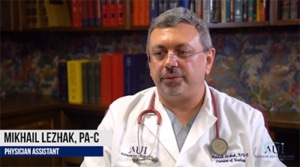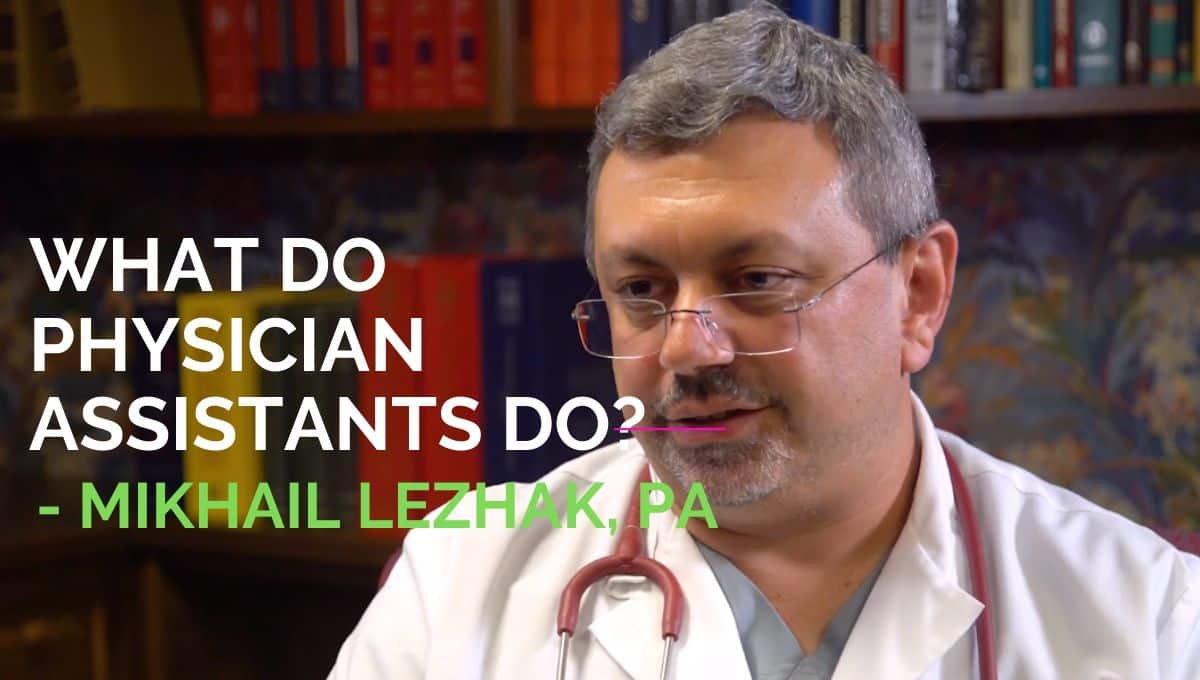Ask Mikhail Lezhak what physician assistants do and you may be surprised by the answer. In the past, all professional medical care was performed by doctors and nurses. But doctors and nurses often spent a lot of time doing repetitive work that limited the time they had to focus on their specialty.
 Physician assistants, especially those in urology, may be called upon to do any of these things to assist the doctor:
Physician assistants, especially those in urology, may be called upon to do any of these things to assist the doctor:
- Patient history checks, both directly with the patient and with recorded medical records. They will review records and update records. Based on what they learn, they will brief their supervising physicians about anything noteworthy
- Perform physical exams. They can do the basic exams, but they also are trained to spot symptoms that require more advanced medical care
- Order and interpret basic laboratory tests
- For many relatively minor types of injuries, they may be qualified to handle the direct treatment
- Assist surgeons doing surgical procedures
- Perform minor surgical procedures, including suturing (making stitches); immunizations and injections; setting up, monitoring and removing intravenous feeds
- Perform preoperative and postoperative care, including managing infection prevention
- Prescribe medications as permitted
- Provide patient counseling on medical issues, including self-care and follow-up
- Set up health management plans and diets
- Assist in maintaining a healthy, safe and sanitary healthcare environment, in accordance with health laws, regulations and accepted medical practices
- Help maintain the proper stocks of medical supplies
- Work with administrators and administrative staff to assure a more smoothly operating medical care environment
Essentially, PAs perform tasks that free up their supervising doctors for more difficult and complicated health issues. If this job sounds a lot like what nurses do, you are right. There is considerable overlap of responsibilities within medical communities.
In Florida, physician assistants do have a limited ability to prescribe and dispense medications. The ability for PAs to prescribe drugs is based on a written agreement between the PAs and their supervising board-certified doctors. That written agreement must have the following:
- Effective for only five years, whereupon a new license is required
- Requires the PA to take 10 continuing medical education credits before each license renewal period, including three hours about safe and effective prescribing of controlled substances
- Only effective with that one PA-doctor agreement; it must be remade if the supervising doctor changes
- Filed with the Florida Board of Medicine
There are some drugs that a PA cannot prescribe. For example, a PA working in urology cannot prescribe many of the same drugs that a PA working in psychiatry would prescribe, and vice-versa. Thus, there is local accountability for physician assistants within Florida about how they handle drugs.
Supervising doctors may have their PAs handle such duties as researching new medical device company products and keep the doctors advised on new drug formularies. PAs may be asked to scan medical journals for interesting issues as well as follow interesting and related legal cases involving their profession. They may help in medical research.
Just like nurses and nurse practitioners, PAs help the system run more smoothly by letting those who specialize spend more time on their side of the practice. The doctors can function more professionally as medical experts, and administrators can spend more time working with business management.
When you see Mikhail Lezhak, PA, at Advanced Urology Institute, you are seeing someone who has a wealth of training and experience in many of the same functions performed by a licensed medical doctor. Rest assured that your doctor still has you in good hands when your visit is with a medical professional who is a PA. For more information about physician assistants, visit the Advanced Urology Institute website.




